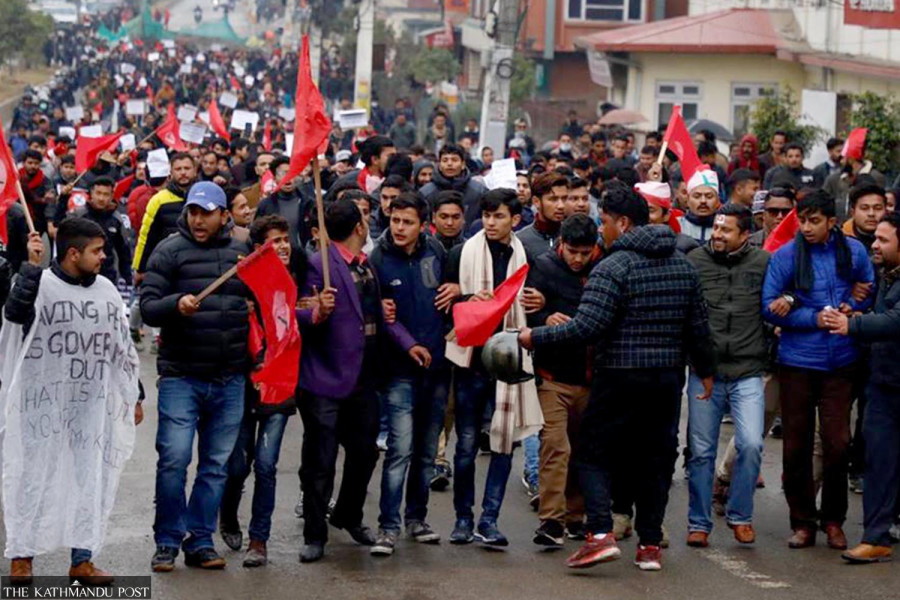Politics
Are Nepal’s student organisations still relevant?
They once played a vital role in political movements but they have now lost their focus, critics argue.
Nishan Khatiwada
As student organisations gear up for the Free Students’ Union elections and the general convention of All Nepal National Free Student Union (ANNFSU) gets underway, many people are questioning the very relevance of student politics.
Student leaders had played a vital role in the anti-Rana rebellion in the 1950s. Their combined strength helped lay the foundation of democracy in Nepal. Over time, student organisations played heroic roles in the big political changes Nepal witnessed, for instance in 1990 and 2006.
But student organisations seem to have lost moorings and turned into mere tools to serve the partisan interests of their mother parties and their leaders. Addressing the students’ problems and raising voice on important national issues is no longer their focus, critics say.
Political historian and professor Rajesh Gautam said the student organisations have veered off track.
“At the start, they were focused on social issues and educational reforms. But their focus gradually shifted to politics, and they are now fully into it,” Gautam said. The over-politicisation of student organisations began in the latter phase of Panchayat era (1960-1990) when the groups started to be divided into pro- and anti-monarchy camps.
After the 1990 movement, student organisations close to the Congress and Communist camps spent their energies demonising each other, ignoring vital matters like students’ rights and educational reforms, said Gautam. “Soon, the student organisations started getting spoiled by their leaders’ lust for money and power.”
For Himal Sharma, a Maoist central committee member and former president of Free Student Union at Tribhuvan University, student organisations have become corrupt. “Since my tenure as the Free Student Union president, there has been no student election in Tribhuvan University because of political conspiracies,” he said.
Student organisations cannot be only involved in politics and if they are, they lose their relevance, Sharma said. “Student organisations should be involved in logical debates and light up the right path for reform,” he said.
The biennial elections held periodically until 2009 have of late been irregular. The last time the polls took place was in 2017 and that too partially.
Irregularity is a major problem. The election of the Free Student Union and conventions of student organisations should be held regularly, the student leaders the Post talked to underscored.
Student politics threw up many prominent politicians while party conventions were regular, but now tokenism is rife, said Ganesh Bhandari, acting president of the Nepal Students’ Union, a student organisation close to the Nepali Congress. “Elections and the conventions should be regular. The FSU election must be held every two years.”
A number of influential political leaders including Nepali Congress President and former prime minister Sher Bahadur Deuba, the party’s general secretaries Gagan Thapa and Bishwa Prakash Sharma, former home ministers Bal Krishna Khand and Bijay Kumar Gachchhadar and other leaders like Gyanendra Bahadur Karki, NP Saud and Chandra Bhandari rose through student politics.
CPN-UML General Secretary Shankar Pokharel as well as the party’s other leaders like Khaga Raj Adhikari, Yogesh Bhattarai, Yagya Sunuwar, Bishal Bhattarai and Mahesh Bartaula also entered national politics from student politics. So did CPN (Maoist Centre) leaders like Himal Sharma and Hitman Shakya.
Now the student organisations are again trying to elect new leaderships. The Tribhuvan University executive committee has finally decided to hold the long-pending Free Students’ Union elections on March 19. Through the elections, the colleges under the university will get elected representatives for next two years.
The student organisations spark no hope, say observers.
Gautam is also not hopeful of the upcoming student elections as the student organisations are bitterly divided. “Whoever is elected will be beholden to their political masters in the respective political parties,” he said. “They are also unlikely to raise their voice in order to solve the problems of common Nepalis.”
Gautam added, “They have completely forgotten their once-vocal stands on national problems and how they used to put pressure on their leaders to address them.”
The number of elected representatives in the Free Students’ Union elections depends on student enrollment. An 11-member committee including the president, vice-president, secretary, joint secretary and treasurer and six members are elected in the colleges having up to 200 students. A 15-member panel is elected when the number of enrolled students is between 201 and 1,000. The committee has 19 members in colleges with up to 1,000 to 3,000 students. Likewise, the FSU executive committee has 21 members if the student enrollment exceeds 3,000.
Even the student leaders agree that their organisations have been failing to hold the political leadership accountable for their wrongdoing.
According to Bhandari, a student organisation should work as the opposition of its mother organisation but that has not been the case of late. “There is no need to conduct general conventions and elections if the elected student leadership continues to rubber-stamp the decisions of senior political leaders,” he said. “Student organisations from across the political spectrum should sit down and together vow to change the way they work.”
But student leaders also hope that a new leadership can ring in the much-needed changes.
Romas Khatiwada, a student leader involved in ANNFSU, which is close to CPN-UML, said there are challenges galore, but there is no reason the new team elected after polls and conventions cannot make a course correction. “For the continued relevance of the student movement, first, we should prioritise the problems of students,” he said. “We were failing as we were directionless and did not have core agendas. But now we will try to come up with new agendas to revive the student movement.”




 10.93°C Kathmandu
10.93°C Kathmandu















